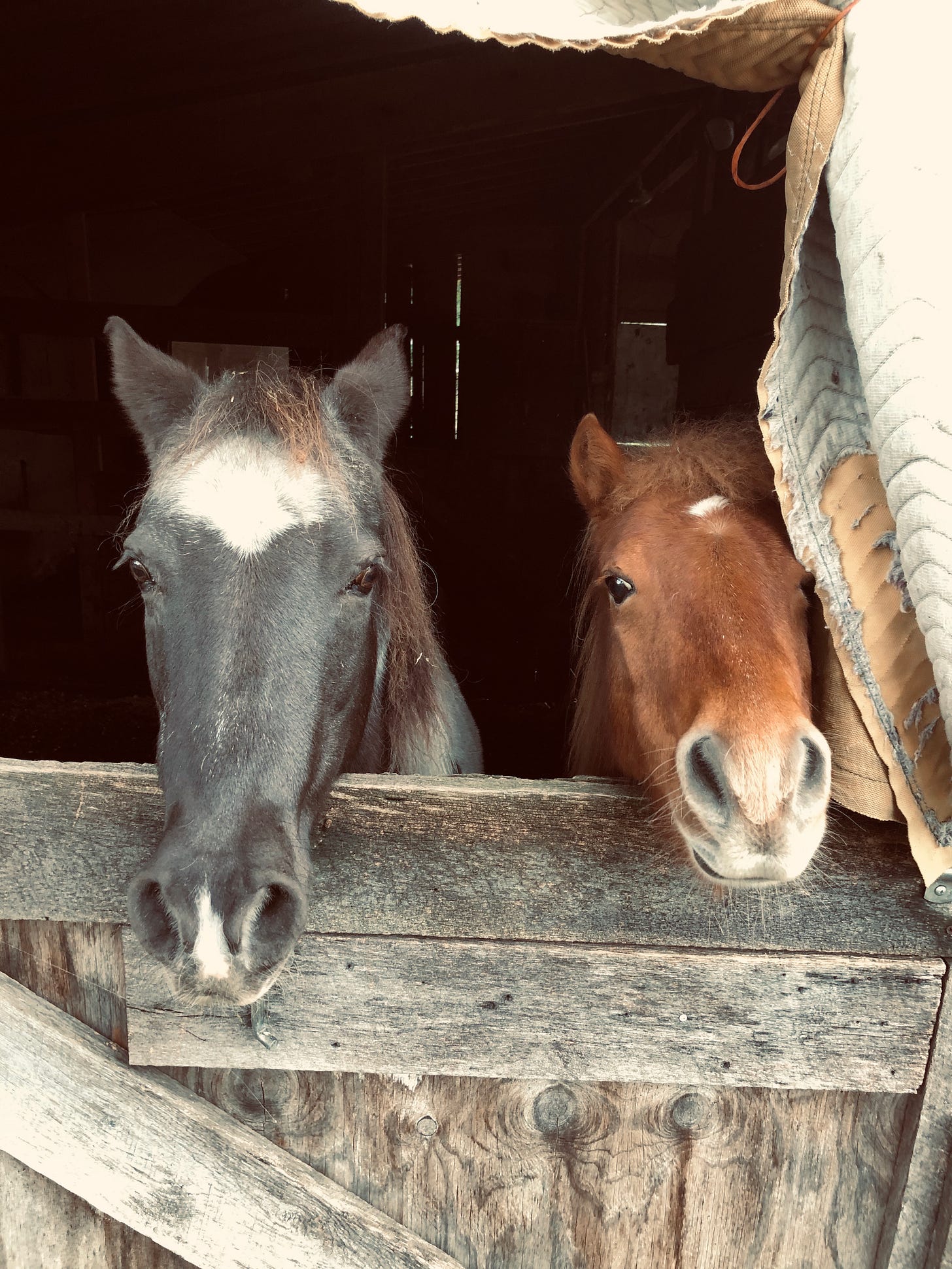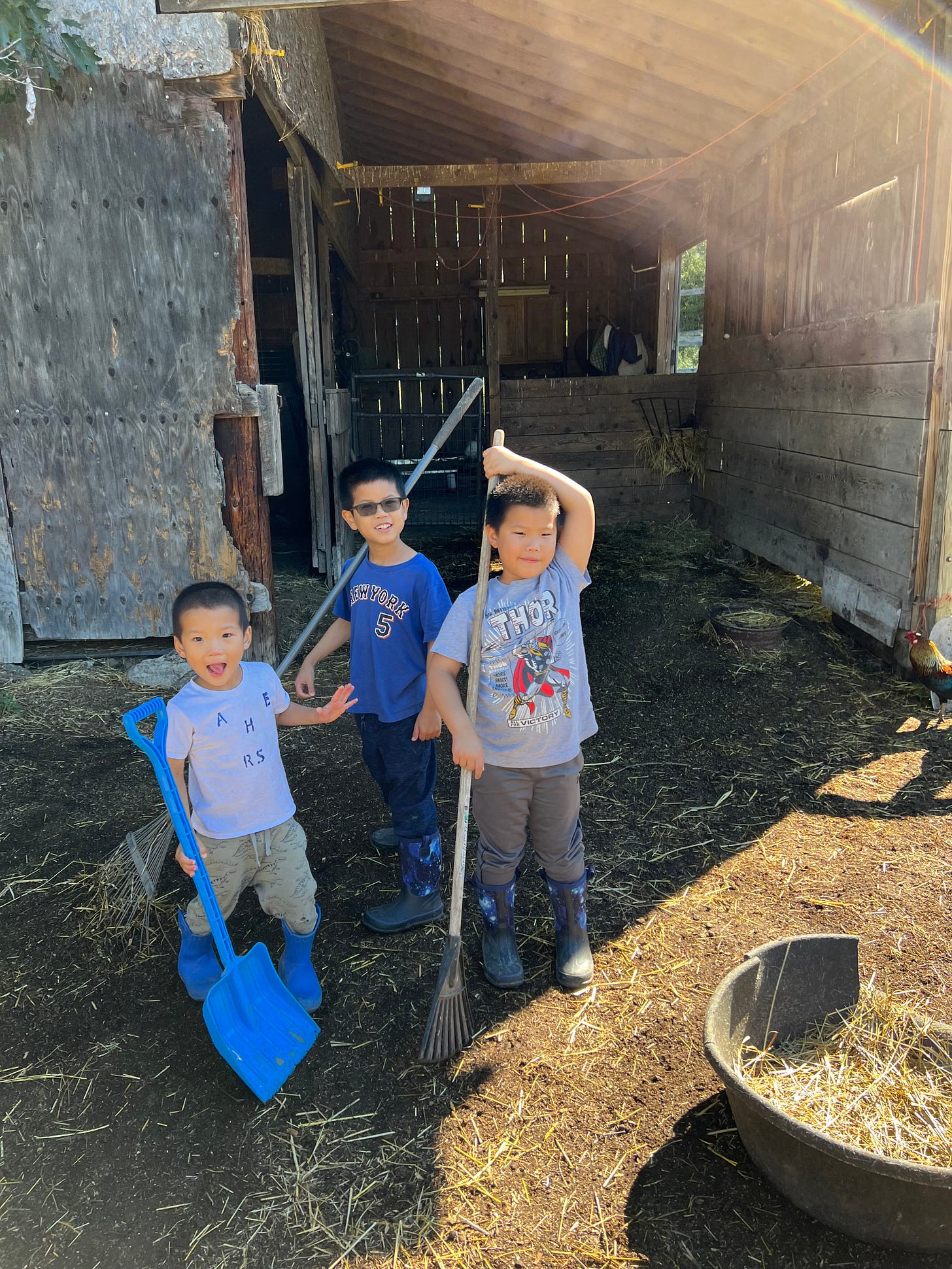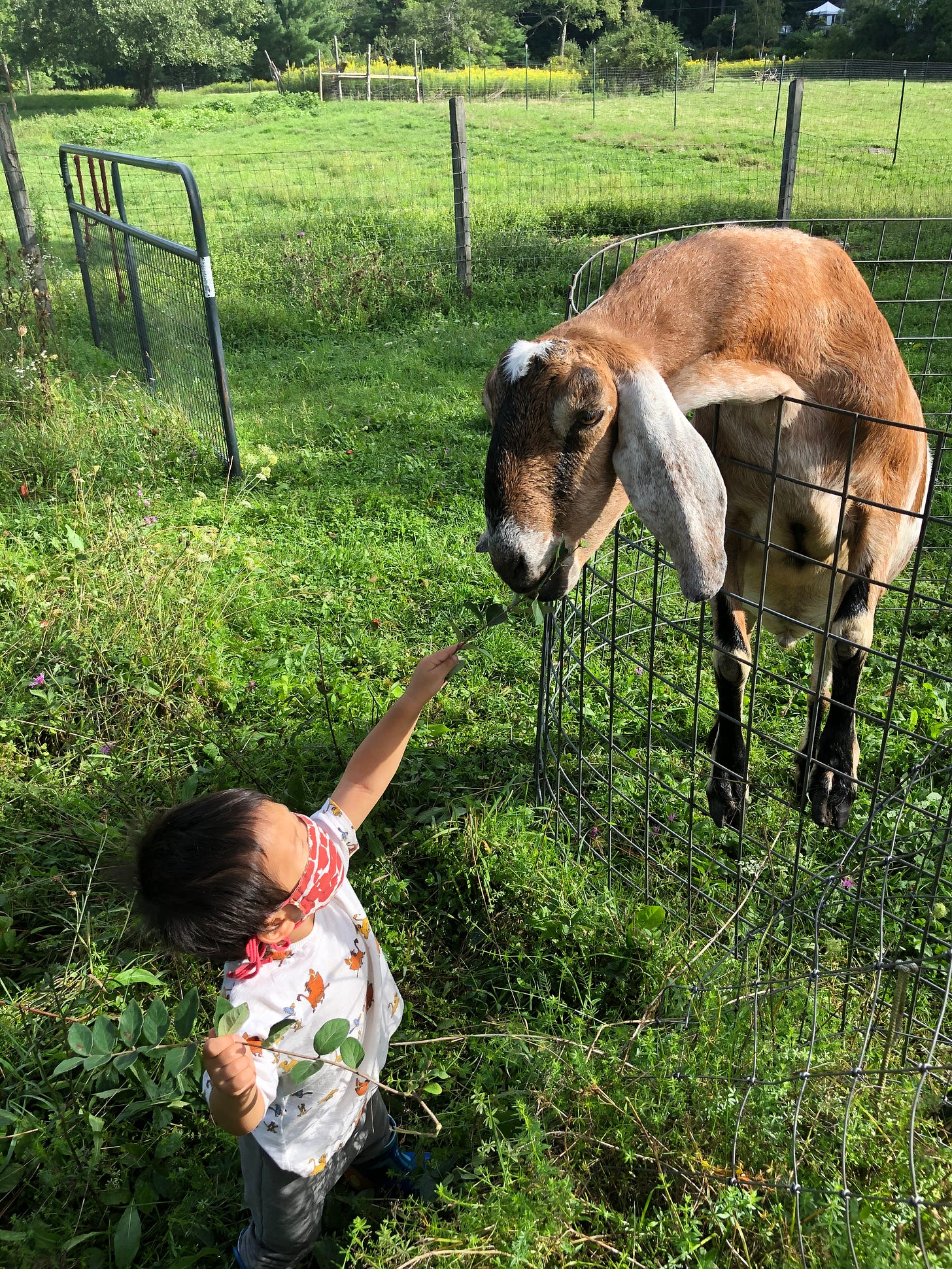Dear Parents...
A letter to the families who bring their kids to my farm for camp... (Letting loose a bit here! My actual letter is much nicer.)
Dear Parents,
Thank you for bringing your kids to my farm. I can’t wait to take them through farm camp! In those two hours they’ll spend with me, I hope they’ll learn a lot of facts about farm animals, feel some pride in caring for the animals, and possibly master some new skills.
A few things, though.
1. Camp starts at 9 am with feeding the animals. The animals are hungry. If your kids are late that’s fine, but be aware they’ll miss out on some of the activities. The animals get fed at 9.
2. Your kids might be a little freaked out at first, especially if they are shy, very young, on the spectrum, or have never been around so many animals. Don’t worry about this! It’s normal and I’m not offended. This is why I don’t offer one-day visits, why I love three-day visits, and why a week of farm camp is the best. From day one to day three is like night to day. By the third morning they understand the sequence of events, and they’ve achieved some mastery and competence over a few things. (Me; “What’s next?” Them: “Feed the ponies!” Me: “What do ponies eat?” Them: “Hay!” Me: “Where’s the hay?” Them: [already marching to the barn]). They also trust me and my rules, and they are ready to get to work. I love watching this transformation. It’s beautiful to see—and also my job gets easier. The kids who come back year after year are the most fun; I just show up and tag along with them.
3. We start with feeding corn scratch to the chickens. Even toddlers can take a handful of scratch out of the bucket and drop it on the ground. Bigger kids can be more intentional and start assessing the situation, looking for chickens on the periphery, making sure everyone gets fed. Shy kids can hold on to their parent’s leg and get acclimated. It’s an ice breaker. Wild kids are corralled back in to the activity at hand. When that’s done we go on to the other animals.
(Sound OFF on this video unless you want to me hear me shouting WOWWWW!)
4. Please don’t tease your children—as so many parents do—about the fact that they might have to clean up poop. There is really nothing comical or debased about shoveling manure. It’s not something your child should feel embarrassed about. We are doing real work, and there is value in manual labor, caring for animals, and working together. Besides, when you tease them about it, you make my job harder. Now I have to jump up and down and run in circles convincing them that this very mundane and obvious chore is not a mean trick we’re playing on them. Most kids end up loving this chore. (It’s actually fun and so satisfying.)
5. You are welcome to drop your children off or stay for the entire time, or any combination of the two. Just remember: Your children are braver, stronger, more polite, and more agreeable when you are not around. This means they’re more likely to take full advantage of the experiences offered to them if you are not here. Some parents want to come, or their kids don’t want them to leave, and that’s all fine! (Another problem: I tend to chat too much with the parents!)
6. If you do come, please follow one of our most basic rules: Parents aren’t allowed to do work in farm camp. The farm camp curriculum was created for little children, not adults! When adults do their own farm camp (and they sometimes do!), we have different activities, harder activities! So for you to pitch in and do work meant for children, especially in response to your children hanging back, is not helpful.
I know that most parents are trying to be polite and jumping to action when their kids hang back, but here’s the big secret: I don’t actually need help finding the end of the hose. I can stuff the hay net with hay very quickly by myself. Ditto with scooping grain into the bucket. I can do all that. But I’m doling out age-appropriate activities to the kids so that through the act of work they can interact more meaningfully with the farm. Don’t worry about them seeming rude. Often kids just need time to process the request. If they’re being evasive about working, I’m fine with waiting while they figure out that it doesn’t hurt to do work, that it’s actually fun, and that the sooner they get this done, the sooner we go onto the next thing. Parents jumping in to do the work rob their kids of these realizations.
7. I will almost never contradict you regarding things you say to your children, but that doesn’t mean I agree with you. If you tell them to get off the rock wall, I won’t argue with that, even if I think balancing on the rock wall, and possibly falling, is a great activity for kids and part of what they’re here to do. If you tell them they’ve watered the tomato plants enough, I won’t argue with that, even if you’re wrong and they need more water. As long as it’s not a real safety issue, I have a general policy of not contradicting parents’ rules because, well, they’re your kids. You know better than I do about your kids. But I know more about the farm. Just be aware that parents are often wrong in what they tell their kids about the farm, and, seriously, I can manage it.
8. Pronouns correspond to biological sex on the farm. Using the wrong pronoun either out of ignorance (“He’s laying an egg!”) or preference (“That pony’s so pretty, I’m going to just call her a ‘she’.”) will get a cheerful correction from me every time. I’ve had kids argue with me, especially about our docile and pretty male pony and our bossy, loud female pony. The sweet one really is the boy, and the bossy one really is the girl. Crazy, right? I just keep correcting them, every single time, and eventually they give up. Biological reality is part of what we’re learning here.

9. We still operate in the rain. The animals have to be fed even in the rain. We can do most of our chores under barn roofs and don’t have to get soaked. But really, showing up in the rain is part of the curriculum.
10. Your kids might incur little bumps or scrapes or get a little scared. They might get chicken poop on their boots, or even on their hands. A goat might step on their foot or overwhelm them. They might accidently touch an electric fence or even get a bee sting. This is part of the curriculum: tiny, manageable amounts of apprehension and discomfort. If I could make these moments happen in a safe and perfectly controlled way, I would. But I can’t. So I make sure all my animals are docile. I am maniacal about real safety—for example I don’t want any little feet stepped on by a pony, which would really hurt. And I pick up toddlers and preschoolers who are overwhelmed by our goats. I don’t want anyone to actually be afraid or truly hurt.
But if we’re lucky, something very slightly scary or ouchy or dirty will happen. We can only hope.
See you at 9 am!








oh my goodness, I want my children to attend farm camp! They are now 23, 23, and 17. I think we missed the boat on this, but WOW what a wonderful program and awesome philosophy. I unknowingly sheltered my kids by not allowing the slightly scary, or ouchy or dirty to happen enough! Enjoy Farm Camp kiddies!!!
You’re amazing, oh what a world could be with more teachers like you. Keep it up!